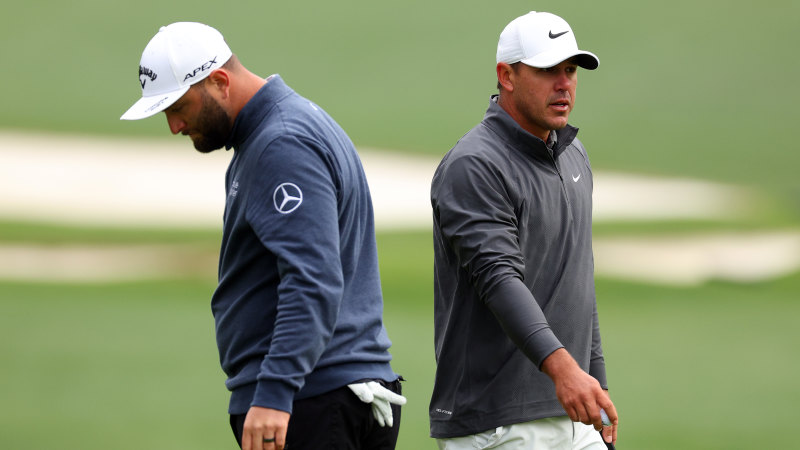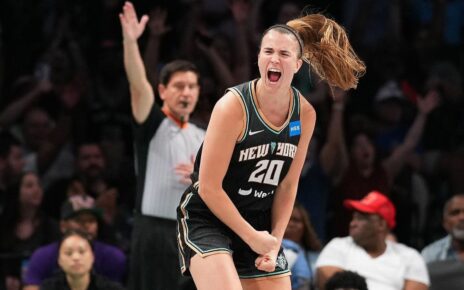Save articles for later
Add articles to your saved list and come back to them any time.
The history books will show that Tiger Woods made the halfway cut at US Masters in 2023, in the process matching the mark for most consecutive cuts ever made at Augusta National.
But to make the cut with his broken body was an accomplishment as impressive as any of his fabled victories.
For Woods, if he misses one more cut at Augusta that’ll be it, forever. Even with only one good leg, that’s a complicated reality to be forced to confront. Right now, professional golf is replete with complex realities.
European Ryder Cup talisman Ian Poulter didn’t drive down Magnolia Lane this year. Poulter, together with a number of other members of the DP World Tour (formerly the European Tour), last week lost a sports arbitration case, in which they challenged the legality of the tour’s rules governing the release of players to participate in rival tournaments – the LIV Golf League.
The arbitration panel determined Poulter and his fellow appellants committed serious breaches of the tour’s code of behaviour, by ignoring directives to not participate in 2022 LIV events. Moreover, the panel upheld the imposition of significant monetary fines dished out to those players, which they must now pay as part of their contracts formed when they joined the tour.
What does this mean in context? In one sense the arbitration decision becomes just another chapter chronicling the fracturing of established realities which had, up to last year, evolved in professional golf.
LIV golfer Brooks Koepka finished second at the Masters despite being ranked well outside the world’s top 100 players.Credit: Getty
Undoubtedly, the arbitration determination, that the European Tour is reasonably and legally entitled to protect its commercial interests by restricting the rights of its members to play in “rival” events, only serves to entrench the positions of the players affected by the decision, and also attitudes of the LIV players more generally.
The archetypal ‘Us vs Them’. Of more troubling concern, however, for the future of professional golf, is that of how LIV players are accounted for within the game.
Brooks Koepka was, a fortnight ago, ranked well outside the world’s top 100 players. Notwithstanding the injuries he’s sustained in recent times, Koepka’s ranking has plummeted from once being classified the best player in the world. He’s no hope of ascending Everest again, due to his decision to join the Saudi-funded LIV league. That reality is a threat to the core integrity of the sport.
Koepka, who finished tied second at Augusta with fellow rebel Phil Mickelson, was only invited to play at Augusta because he’s won a US Open and a couple of US PGAs in the past five years. If he’d been relying on rankings points for his place at Augusta, he’d have to be inside the world’s top 50.
Shoving to one side the pageantry of Augusta National, professional golf has the propensity to become ever so slightly silly, in not too long from now. What happens to the sixty-odd players who’ve signed for the LIV Tour a year or two from now if whatever they achieve is not counted? Rankings are based entirely on performances over the previous 24 months.
The crux of the issue is that LIV events are excluded, for the purpose of all calculations of the Official World Golf Rankings. And that’s an appalling reality that’s rightly offensive to all professional players. Most certainly, it isn’t just the LIV players that this freezer treatment affects.
There’s an absurdity here. Players began breaking away to the LIV almost a year ago. There’s been a series of LIV tournaments played. And yet those tournaments, and their results, are ignored for measuring the performance of the thousands of players on the OWGR rankings.
There’s at least two problems with the intransigence of those in charge of the OWGR (including PGA Tour and European Tour representatives), vis-à-vis LIV players and their achievements in LIV tournaments.
A year ago, the exclusion could be explained on the basis that assessments needed to be made as to what LIV is. Now, the exclusion seems churlish and it’s definitely damaging.
LIV events are Mickey Mouse, with their 54-hole, no cut, limited field formats. But they must count for something. In a perfect world, the performances at Augusta of Mickelson and Koepka should give cause for shrinking the chasms in professional golf. In reality, the idiocy will just resume.
For those presently are ranked inside the top-50 of the OWGR, that ranking is no longer accurate because players such as Cam Smith, Dustin Johnson and Koepka have their regular-season results excluded. The best can’t be classified as the best anymore.
More importantly, the reality in future years will become that participation in the major championships, by reference to world rankings, will exclude players who should be in those tournaments. What then happens is that the major tournaments themselves will be left with a proneness to diminished importance. It’s a slippery slope.
That’s not to say that a LIV event should be ranked on par with a PGA Tour event that has a field four times as deep. LIV is anything but cutthroat and everyone knows that.
However, there’s a 54-hole development tour in South Africa that’s recognised for OWGR purposes. It’s inexplicable that the LIV Tour, which touches down in South Australia next week, isn’t considered on par with some fifth-rate series of African tournaments.
The problem is that the highest-ranking officials from the PGA Tour and DP World Tour sit among those who decide which tournaments and tours are recognised for rankings purposes. Fair and reasonable, or exclusionary and anticompetitive? The latter, undoubtedly.
The OWGRs are controlled by a company registered in the United Kingdom, named “Official World Golf Ranking”. Its board includes officials from the DP World Tour, PGA Tour and the R&A.
No doubt LIV players affected by the refusal to sanction their events for rankings points will commence proceedings against the OWGR corporation and, likely, its directors. The dispute is replete with elements of anticompetitive behaviour and collusion.
If those proceedings ensue, it’s problematic as to what OWGR’s defence might be, frankly. Indeed, it’s hard to see the LIV players losing that argument.
Sports news, results and expert commentary. Sign up for our Sport newsletter.
Most Viewed in Sport
From our partners
Source: Read Full Article



